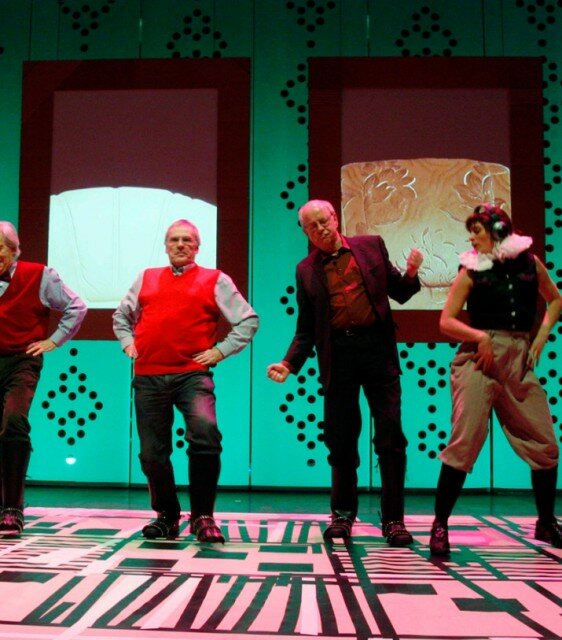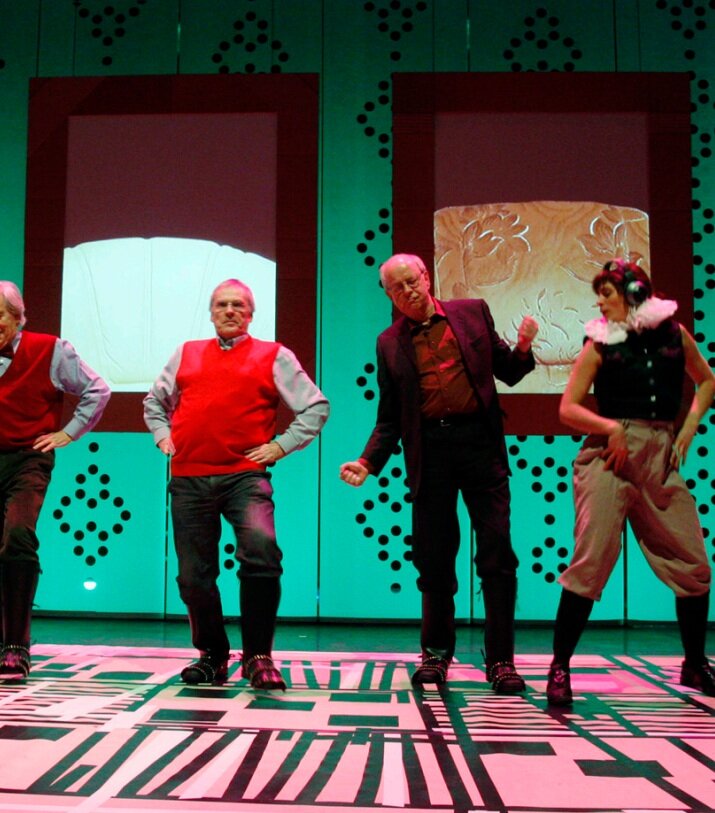
On the Boards‘ Lane Czaplinski sums up how many (if not most) of us would first react to She She Pop‘s Testament (last performance Sunday night at OtB; tickets): “The thought of my dad on stage in a highfalutin Lear terrifies me. What would he say and do?”
There’s a reason the rambunctious elderly feature in comedy so often — we’re scared of them.
But there’s another level to the German performance collective’s work that is even more terrifying, which is that parents are mortal — their decline, physical and mental, ends in death, which they are necessarily not around to give their children help in navigating.
Testament is a tender but tough-minded response to that absence, both a way of preparing oneself to be gone, no longer able to exert influence or offer aid; and to be left, no longer able to argue with or embrace.
She She Pop are careful not to call themselves actors, in the sense of people who are there purely to entertain you: “Instead, we give ourselves and others interesting tasks to fulfill and solve them in public on stage,” they write in the program notes. In this case, “others” means three of their fathers.
This doesn’t mean the collective members are not technically proficient performers — they even harmonize with boy-band precision.
But what the cast — Lisa Lucassen, Sebastian and his father Joachim Bark, Fanni and her father Peter Halmburger, and Ilia and her father Theo Papatheodorou — are doing is amending Shakespeare’s King Lear as if it were a contract: highlighting relevant areas, striking out lines, writing in new directives. (Not everyone who participated in the show’s creation appears: Johanna Freiburg, Mieke and Manfred Matzke, Berit Stumpf. Sometimes the performers trade other father-daughter parts.) The fathers wear fatherly outfits, while the younger generation wears Lea Søvsø’s Shakespearean ruffled collars, and breeches.
Much of the show was generated in rehearsals, as the fathers and daughters (and son) read and discussed Lear, and grappled both with the text, and with its modern-day analogues: last wills and testaments, costs of elder care, the day-to-day dramas of intergenerational attitudes in conflict. For the show, in a Brechtian touch, the performers don headphones and flatly repeat taped recordings from rehearsal, which at times contrasts strongly with the heated upset of the language.
The three fathers are almost all in agreement that the show demands a loss of dignity (less so in the U.S., I imagine, than back home, where people they might know socially could attend). For the first few acts, they sit to the left in plush recliners, acting as a world-weary Greek chorus: When they aren’t speaking themselves, they trade knowing glances about the younger generation. The wisdom of the papa is captured perfectly by the former physicist’s attempt to fix Lear by writing out a differential equation that optimizes Lear’s “darker purpose”: arranging a competition of sorts to divide up his kingdom among his three daughters.
Oh yeah? respond the daughters (and son), working out a tremendously detailed accounting of how grandparental affection and support is distributed unequally among child-having and childless offspring. This is all light-hearted enough, even though it touches on very real issues, and the fathers tend to bridle a bit at discussing it in public.
But the scene where a daughter recites the list of things she’s preparing herself for as her father ages (wiping his pee off the toilet, cooking soft foods, listening again to that anecdote), and he singspiels “I Will Always Love You” — that cuts right to the bone.
For Lear‘s storm, the fathers unburden themselves of their anxiety about their children’s future in theatre, their discomfort with what they perceive as simple exhibitionism, and their uncertainty over whether their kids are any good. Judging from the startled, pained laughter in the audience, more than a few people had been through the same ordeal with their parents. Sven Nichterlein’s lighting, Christopher Uhe’s music, and Florian Fischer’s sound turn the scene into a Pips-meets-punk freak-out.
One of most effective staging elements is that cameras are used to create projected portraits of whoever sits in the recliners. While the fathers watch their children onstage, the audience sees them looking out at them, head-on. It may be a virtue of necessity — though the fathers are all good public speakers, the arrangement lets them maintain a certain personal distance — but it directs the fatherly gaze at the audience, its judgment and approvals, its half-grins and raised eyebrows, its cool removal. Later, as the three 70-somethings strip down, you get a sense of the gift in the action.
It’s a gift extended to the audience. Very few moments in theatre are so theatrically Greek in this way, where the staged imitation of an action, for all its artifice, instantiates another, augmented reality. You know, King Lear is an old man lost and out of his mind in a storm, there’s a story there you may or may not relate to — the ritual of mimesis is different, more bedrock. You participate first, make sense of it later.
In a perfect world, we’d all have She She Pop’s experience, we’d all sit down while there’s time, we’d all be willing — but we live in a world of shortcomings, of our own and others. Lear is a tragedy, the foolish father a scapegoat for all our failings, driven out. She She Pop invites him in. It’s not a metaphor — there they are, three fathers, onstage, performing the way fatherhood slips out of older, tremor-shaken hands. If you are there, you feel lucky to see the majesty in it.
